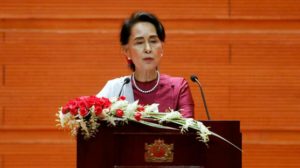[Nobel Peace Laureate] Suu Kyi Can’t Ignore the People’s Tribunal
NOBEL LAUREATES, 2 Oct 2017
Prothom Alo [Bangladesh] | Editorial – TRANSCEND Media Service

Myanmar state counsellor Aung San Suu Kyi delivers a speech to the nation over Rakhine and Rohingya situation, in Naypyitaw, Myanmar on 19 September, 2017. Photo: Reuters
24 Sep 2017 – The verdict issued by the International People’s Tribunal in the Malaysian capital Kuala Lumpur on Friday [22 Sep], which indicted Myanmar’s military as well as its state counsellor Aung San Suu Kyi for war crimes and ethnic persecution in Myanmar, reflected the expectations of the peace-loving people of the world.
The tribunal comprising legal and human rights experts from various countries, passed this verdict based on evidence and the testimony of victims among the Rohingyas and other relevant persons. They also called upon the Myanmar leader as the army chief as well to defend themselves. None of them turned up or felt the need to respond.
The people’s tribunal called for an immediate halt to the ethnic persecution in Myanmar and also put forward 17 recommendations. The implementation of these recommendations can facilitate an end to the ethnic conflict and establish peace in the country. Among the recommendations is the proposal to abolish the 1982 Citizens’ Act and grant the Rohingyas full citizenship, and also bring an end to the persecution of the Kochin and Rohingya ethnic communities.
The verdict also called for international and regional organisations to enforce an arms embargo on Myanmar, freeze the foreign bank accounts of the government officials involved in the crimes against humanity, and place a ban on their foreign travel.
In the meantime, the UK has suspended its training of members of Myanmar’s military. This is the first step towards an arms embargo. We issue a similar appeal to all countries which have military cooperation with Myanmar. Ethnic cleansing cannot be carried out in the name of protecting the country’s sovereignty.
The People’s Tribunal may not have legal standing, but it has political and international significance. Such a people’s tribunal was set up for the first time, headed by British philosopher Bertrand Russell, during the Vietnam War in the sixties. Later people’s tribunals were set up against such crimes in Latin America, East Timor, Sri Lanka and other countries of the world.
While the People’s Tribunal hearing was underway in Kuala Lumpur, Aung San Suu Kyi delivered a speech in Myanmar in which she virtually defended the army operation against the Rohingyas. It was unimaginable that such atrocities could take place during the rule of this Nobel peace prize winner who sees herself as the symbol of non-violent movement. She simply cannot ignore the verdict of the People’s Tribunal or international opinion.
___________________________________
The Nobel Peace Prize 1991 was awarded to Aung San Suu Kyi “for her non-violent struggle for democracy and human rights.”
Go to Original – en.prothom-alo.com
DISCLAIMER: The statements, views and opinions expressed in pieces republished here are solely those of the authors and do not necessarily represent those of TMS. In accordance with title 17 U.S.C. section 107, this material is distributed without profit to those who have expressed a prior interest in receiving the included information for research and educational purposes. TMS has no affiliation whatsoever with the originator of this article nor is TMS endorsed or sponsored by the originator. “GO TO ORIGINAL” links are provided as a convenience to our readers and allow for verification of authenticity. However, as originating pages are often updated by their originating host sites, the versions posted may not match the versions our readers view when clicking the “GO TO ORIGINAL” links. This site contains copyrighted material the use of which has not always been specifically authorized by the copyright owner. We are making such material available in our efforts to advance understanding of environmental, political, human rights, economic, democracy, scientific, and social justice issues, etc. We believe this constitutes a ‘fair use’ of any such copyrighted material as provided for in section 107 of the US Copyright Law. In accordance with Title 17 U.S.C. Section 107, the material on this site is distributed without profit to those who have expressed a prior interest in receiving the included information for research and educational purposes. For more information go to: http://www.law.cornell.edu/uscode/17/107.shtml. If you wish to use copyrighted material from this site for purposes of your own that go beyond ‘fair use’, you must obtain permission from the copyright owner.